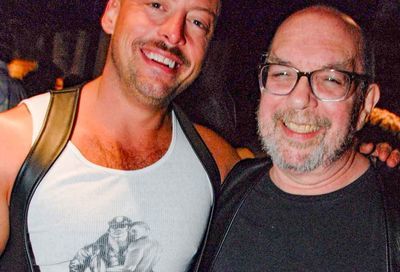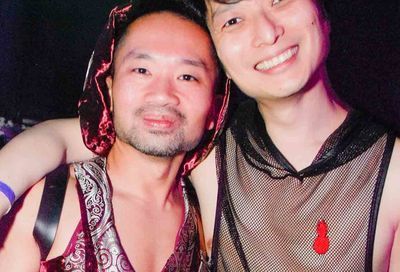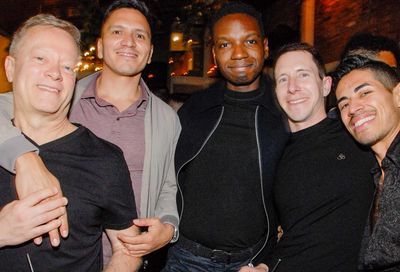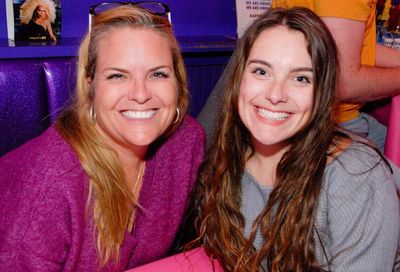From the Rooftops
Once you come out, there's no going back
One of the first things my mother said to me after I came out to her — via the good old U.S. Postal Service, back before e-mail was prevalent — was that she was proud of me, but she wasn’t ready to shout it from the rooftops.
I can’t remember if she said this on the phone when she called me the evening she’d received my missive, or if it was in the letter she started writing in response to what I told her. But the phrase echoed in my head — the concept of shouting it from the rooftops. It had never occurred to me to want to shout anything from the rooftops — I had always been more understated than that, dumping my guts out in writing but, at that point, not publicly.
At the time, I was keeping a chronological list of the people I had told about my nascent lesbianism — first I identified myself as bisexual, but it soon became apparent that my chances of sustaining a long-term relationship with a man were pretty close to nil. I can’t remember what number I got to before I stopped keeping track, or what number I reached when I finally took the plunge and shared the news with my mom.
Once I started the process of coming out, it never even crossed my mind to try to stay closeted. It was a foregone conclusion that I would live my life openly. I never imagined hedging when someone asked about my romantic attachments, and it never occurred to me to be afraid to talk about my girlfriends in mixed company. When I started dating someone seriously, I put her picture on my desk at work — and people would ask if she was my sister. No, I’d tell them. She’s my girlfriend.
Some of them may have assumed I was using the term in the straight-girl sense, but it wasn’t through any hedging on my part. I was forthright.
It was Iowa in the early ’90s, but my experience was smooth, once I started revealing what had been a shameful, scary secret for many years. I remember a couple of awkward conversations with friends — one thought I should try having sex with a man before I made up my mind for sure; another urged me to wait to tell my mother until after I’d started dating a woman, because what if I was wrong?
But aside from those tiny bumps in the road, I was energized by the process of opening up to the people in my life. Part of the reason I was so well received was, very likely, that I hadn’t been working hard to fool anyone about my sexual orientation. I didn’t seriously date many guys, I didn’t wear make-up, I didn’t carry a purse or wear feminine trappings.
I was lucky that when I did start dating women, I fell into relationships with people whose attitudes were much like mine. They couldn’t be bothered to be closeted either. My first two girlfriends weren’t out to their parents when I started those relationships, but both tended to that matter in short order.
When I got serious with one of them, there was nothing holding us back. We traveled to Kansas City and Chicago for those cities’ pride festivals one summer, and after several months together, we moved to the Washington area and got our pride on here.
Because I’ve done some pretty public things, like placing engagement and civil union announcements in my hometown paper and in the paper in Des Moines — in both cases breaking ground and triggering news coverage of my partner and me — there’s little chance that anyone from my past, at least among those who are paying attention, has missed the detail of my lesbianism. There is a small population of people I knew in the summer of 1989 when I was working at a newspaper in southern Ohio; I don’t know that any of them ever became privy to my lesbianism, but I know it didn’t happen before I lost touch with them. That was the same summer I chalked up the first name on my list of people I would come out to — my friend Tina, who responded the best way I know: “Me too!”
But I wasn’t willing to take the risk and tell my close friends in Ohio that summer. I later learned that one of the women who worked at the newspaper had been hinting around about what were apparently suspicions about me. “Do you think Kris is — funny?” she asked the woman I was closest to that summer. My friend didn’t miss a beat: “I think she’s hilarious.” When she recounted that story to me months later, I was in town visiting with my boyfriend Kevin — I wasn’t out to him, and I wasn’t ready to be chased out of town, so I just laughed and committed the exchange to memory.
If I had the chance to see the folks from that summer now, I wouldn’t pause for a second before talking about my partner or our relationship. I was almost 19 years old when I started making my list; I had kissed one girl before that, but we promptly reassured each other that we were straight. For most of the time before that, I had been deathly afraid of the knowledge that grew in me every day: I liked girls, and there was no way I was going to beat that down.
I lived in denial for part of that time and deep shame for all of it. I had no idea what it might feel like to be proud of who I was. But after I took the plunge, there was no looking back. I know some people make fun of the concept of “gay pride.” They don’t, or don’t want to, understand what it means to finally embrace something that has been castigated by society and regarded by those of us who have seen it as a malignancy at the core of our being.
To break free of that self-assessment, and to decide that society can take its castigation and shove it, is to understand what gay pride is. It’s about loving and respecting a part of ourselves that we had learned to despise. It’s about realizing that shame has no place in our decision to live honestly and openly.
What a great reason to celebrate.
Kristina Campbell’s column “Alphabet Soup” appears bi-weekly in Metro Weekly. She can be reached at kcampbell@metroweekly.com.
Support Metro Weekly’s Journalism
These are challenging times for news organizations. And yet it’s crucial we stay active and provide vital resources and information to both our local readers and the world. So won’t you please take a moment and consider supporting Metro Weekly with a membership? For as little as $5 a month, you can help ensure Metro Weekly magazine and MetroWeekly.com remain free, viable resources as we provide the best, most diverse, culturally-resonant LGBTQ coverage in both the D.C. region and around the world. Memberships come with exclusive perks and discounts, your own personal digital delivery of each week’s magazine (and an archive), access to our Member's Lounge when it launches this fall, and exclusive members-only items like Metro Weekly Membership Mugs and Tote Bags! Check out all our membership levels here and please join us today!




















